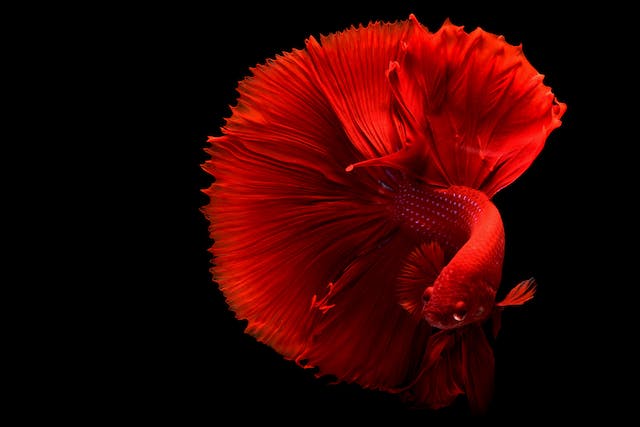Table of Contents
If you’re a betta fish owner, you may have wondered how long your fish can live out of water. It’s a common misconception that betta fish can live for extended periods of time outside of their aquatic environment. However, the reality is that betta fish are not adapted to live outside of water for long periods of time.
Betta fish have a specialized labyrinth organ that allows them to breathe air from the surface of the water. This organ is what allows betta fish to live in low-oxygen environments, but it doesn’t mean that they can live out of water for an extended period of time. In fact, betta fish can only live out of water for a few minutes before they start to experience oxygen deprivation and other health problems.
The lifespan of a betta fish can vary depending on several factors, such as their genetic makeup, diet, and living conditions. On average, betta fish can live anywhere from two to five years in captivity. However, if you want to ensure that your betta fish lives a long and healthy life, it’s essential to provide them with a suitable aquarium environment and proper care.
Betta Fish and Their Unique Survival Mechanisms
Betta fish are a type of labyrinth fish, which means they have a unique organ called the labyrinth organ that allows them to breathe air. This is an important adaptation that helps bettas survive in low-oxygen environments, such as the shallow waters of their native habitat in Southeast Asia.
While most fish rely solely on their gills to extract oxygen from water, bettas can also take in oxygen from the air. They do this by coming to the surface and gulping air into their labyrinth organ, which is located just above their gills. The labyrinth organ has a highly vascularized structure that allows bettas to extract oxygen from the air and transfer it directly into their bloodstream.
This ability to breathe atmospheric air gives bettas a unique advantage over other fish, as it allows them to survive in stagnant or oxygen-depleted water. In fact, bettas can survive for short periods of time out of water as long as their labyrinth organ remains moist. This is why bettas are sometimes sold in small cups or containers with just enough water to cover their gills.
However, it’s important to note that bettas still require water to live and thrive. While they can survive for short periods of time out of water, prolonged exposure to air can be harmful to their health and well-being. Additionally, bettas still rely on their gills to extract oxygen from water, so it’s important to provide them with clean, well-oxygenated water in their aquariums.
Influence of Environmental Factors
When it comes to the survivability of Betta fish out of water, there are several environmental factors that play a crucial role. In this section, we will discuss the impact of temperature, importance of oxygen, role of humidity, impact of light, influence of water quality, aquarium setup, Betta fish behavior, health and survival out of water, proper care and maintenance.
Impact of Temperature
Temperature is one of the most important environmental factors that affects Betta fish out of water. Cooler temperatures can slow down the metabolism of the fish, which can help it survive for a longer period of time. However, if the temperature drops too low, it can cause the fish to go into shock and die. On the other hand, if the temperature is too high, it can cause the fish to become lethargic and weak, which can also lead to death. It is important to maintain a stable temperature and use a heater if necessary.
Importance of Oxygen
Oxygen is another crucial factor for the survival of Betta fish out of water. Fish obtain oxygen through their gills, which can only function in water. However, Betta fish have a labyrinth organ that allows them to breathe atmospheric air. This means that they can survive out of water for a short period of time as long as they have access to oxygen. It is important to provide oxygenated water and ensure that the fish has access to atmospheric air.
Role of Humidity
Humidity is also important for the survival of Betta fish out of water. If the air is too dry, it can cause the fish to become dehydrated and die. It is important to maintain a humid environment, especially if the fish is out of water for an extended period of time.
Impact of Light
Light can also affect the survivability of Betta fish out of water. Too much light can cause the fish to become stressed and weaken its immune system, making it more susceptible to infections and parasites. It is important to provide a suitable amount of light and ensure that the fish has access to hiding places.
Influence of Water Quality
Water quality is essential for the health and survival of Betta fish out of water. Poor water quality can lead to stress, weakened immune system, and death. It is important to maintain a suitable pH level, perform regular water changes, and avoid using tap water that contains chlorine and other harmful chemicals.
Aquarium Setup
The aquarium setup can also affect the survivability of Betta fish out of water. It is important to provide a suitable tank size, cover the tank with a lid, use a filter to maintain water quality, and provide decorations and live plants to create a suitable environment for the betta fish.
Betta Fish Behavior
Betta fish are active and territorial, and they can become bored and stressed if they are out of water for an extended period of time. This can weaken their immune system and make them more susceptible to infections and parasites. It is important to provide a suitable environment and ensure that the fish has access to hiding places.
Health and Survival Out of Water
Betta fish can live out of water for a short period of time as long as they have access to oxygen and a suitable environment. However, if the fish is out of water for too long, it can become stressed, weakened, and susceptible to infections and parasites. This can lead to a weakened state, internal bleeding, and death.
Proper Care and Maintenance
Proper care and maintenance are essential for the health and survival of Betta fish out of water. This includes providing a suitable environment, maintaining water quality, providing a suitable diet, and avoiding stress and boredom.
Conclusion
In conclusion, the survivability of Betta fish out of water depends on several environmental factors, including temperature, oxygen, humidity, light, water quality, aquarium setup, Betta fish behavior, and proper care and maintenance. By providing a suitable environment and taking proper care of the fish, you can increase its chances of survival out of water.







